Cara Viola | Author Profile
Cara Viola was born in 1988 in Mülheim a.d. Ruhr, Germany. She studied English Literature and Celtic in Glasgow and Oxford. She now lives in an old house in Luxembourg, where she works as an editor and ghostwriter. The Exhibition is her debut novel.
What were your inspirations behind The Exhibition? What made you gravitate towards woodworking as Madeleine’s profession?
It all began with my deep love for Kelvingrove Museum. I used to live nearby on Argyle Street and would pop into the gallery and wander around the place. When I found out that it was built specifically to coincide with the opening of the International Exhibition in 1901, I thought what an amazing setting for a novel that would be. I also studied Celtic artifacts at Glasgow Uni and they have always fascinated me – but what fascinates me even more is the stories people connect with them.
There’s this image Glasgow has of a super rough city with a history of knife crime. Of course, it has a dark side like any other place, but I adore Glasgow. I had this image of a woman with a knife in her hand but she’s actually using it to create amazing objects. It was just an image at first. That’s how Madeleine became a woodworker. Of course, she uses all kinds of tools in her profession, but that is how it started.
What is The Exhibition about and what aspect was the hardest to write?
It’s about a young woman who moves to Glasgow to start a new job copying priceless artifacts to make souvenirs for the International Exhibition. She moves into the newly-built Kelvingrove Museum so that she has direct access to the collections – the head curator and his wife are living there too – otherwise nobody else is staying in the huge building. But one day, Madeleine starts to hear other footsteps and voices, and she begins to realize that her employment is only a cover for something quite different that is going on…
I guess it’s about the ideas we tell ourselves, the way we invent stories and histories for ourselves, the way stories contribute to a country’s heritage and all the ethical implications that brings with it.
The hardest bit to write was the ending, I think. I love a good ending and I wanted The Exhibition to have a really satisfying one. I wrote many different versions. But I think I picked the right one.
What’s the best writing advice you’ve ever received?
Haha.
“Just shut up and write.”
Talk to us a bit about your writing habits. Do you write early in the morning, or through the night? Pen or laptop?
Early in the morning definitely works well for me, especially when I’m still half asleep and my brain is a bit foggy. I actually often write a first draft by hand; there’s something about the tactile nature of holding a pen that I love.
What were the highs and lows of the writing and publishing process (if any)?
I think every writer knows about the lows – loneliness, self-doubt, anxiety – but the highs make up for everything: there is nothing quite like it in the world when somebody loves your writing. For me, writing is about connecting with others, to the characters I create and the readers. I’m saying, look, here is the thing I made, and I made it for you.
The publishing process is a funny thing really. You’ve sat with your manuscript all alone for so long (years, in my case), and suddenly it doesn’t really belong only to you anymore. I adore having my work edited, though, I really do. It’s such an amazing feeling. And it’s also so nice to finally let your work go. I’m a big believer that once a work is out there it doesn’t belong to the author anymore. It belongs to the readers.
What are you reading right now?
The truth is that I have found reading for pleasure really difficult towards the end of finalizing my novel. My head was so full of The Exhibition, I couldn’t concentrate on any other story. However, I am writing this sitting in my local library, and I cannot wait to see which titles I’ll be taking home with me.
Okay, deep one coming up: Why do you write?
Oh goodness. Okay, I think the truth probably is that there are too many thoughts in my head, and they need to go somewhere. A sad truth is also: writing gives my thoughts a reason to be.
But a big reason for me is also that books have saved me on many occasions, and I’ve always wanted to give that back if I could.

